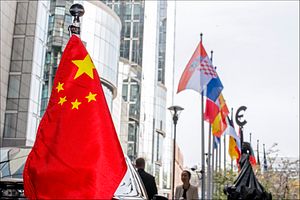The European Union’s China policy is in flux. A new resolution adopted by the European Parliament is more critical and principled that the previous one adopted only three years ago in 2015. This step should be welcomed, but its needs to be complemented by a strategic vision on how to promote liberal values at a time when Europe needs to closely cooperate with China.
In 2015, the European Parliament, though seeing China as a difficult partner, expressed its hope to work with the Beijing government on EU-China relations that it called “a source of inspiration” for a “multipolar and globalized world.” In the latest resolution, signs of optimism are scarce; rather, it emphasizes the need to “remind China of its international obligations and responsibilities.” Discussing issues ranging from human rights, through Chinese investments and the infrastructure policy known as the Belt and Road Initiative (BRI), to global governance and the international trade regime, hopeful tones have been replaced by skeptical if not critical views.
What Is Behind This Shift in Perspective?
This radical shift in perspective reflects three developments:
First, China’s authoritarian turn under Xi Jinping has set in motion a process of disillusionment in Europe. In the early days of Xi’s presidency in China and particularly after a meeting of the all-powerful Chinese Communist Party’s Central Committee in 2013, European observers had high hopes for substantial economic reforms. The more Xi has consolidated his power, the clearer it became that China is politically becoming more authoritarian and is economically unwilling to liberalize its state-permeated economy. This development finds expression in the European Parliament’s resolution, for example, when it recalls that China’s presidential term limits — abrogated in early 2018 — were introduced in response to the excesses of the Cultural Revolution.
Second, the shift in views is a response to China’s ever growing international power. Donald Trump’s America is less reliable in international affairs and questioning the Western alliance with Europe. This has made China an even more important actor for the development of the EU’s international relations. Accordingly, the new report shows the European Parliament’s rising interest being more detailed and knowledgeable compared to its predecessor in 2015. The rapporteur, the Dutch conservative Bas Belder, made tremendous efforts to consult China experts from all over Europe when drafting the text. To some extent, the more critical tone is the result of the resolution’s more substantial basis.
Third, the European Parliament’s new resolution is yet another expression of the growing European fear of China’s rise. The EU is concerned about the crisis of liberal democracy, the questioning of free trade, and the undermining of rules-based multilateralism. Although these developments cannot be primarily traced back to China’s influence, the country’s political and economic successes as well as its public diplomacy are perceived as adding even further to a growing ideological threat for the EU. The times when Europe confidently carried out a “constructive engagement” strategy, believing that China would turn into a liberal state, are gone.
Principled But Not Strategic
No doubt, the latest China resolution of the European Parliament is more realistic compared to the previous one. The European Parliament responds to the rise of a powerful authoritarian state with an even more pronounced affirmation of the core values that are constitutive for the European Union as such. This strong stance for liberal values should be welcomed.
However, what the new China resolution lacks is a much needed strategic vision. China will outright reject the resolution’s claims. This situation leaves no potential to induce a constructive dialogue on either foreign or domestic affairs.
This is regrettable. Under Trump, the United States is an unreliable partner questioning the very foundation of the transatlantic alliance and the rules-based international system. The EU needs to cooperate with new partners, including autocracies such as China where both share common interests.
China is unlikely to transform into a democratic state under the rule of law with a free market economy anytime soon. Working with China, therefore, means constant friction when it comes to norms and values. This goes to the very foundation of the EU, which is constituted upon core liberal values: How should the EU promote liberal values in its relations with a more and more powerful authoritarian China? What goals are realistic? And which tools are most effective?
This requires a process of strategic reconsideration aiming at closer cooperation with China without significantly selling out the EU’s normative aspirations. In this regard, the European Commission is launching a new high-level meeting to take strategic decisions with all Directorate-Generals. The European Council strives for more comprehensive information sharing so that a coherent European China policy can take form. On September 19, a new European connectivity strategy will be released, which in some respects is expected to rival China’s Belt and Road Initiative. This is a good start.
The European Parliament has decided to continue its tradition of being the most principled actor within the EU. While not providing a strategic vision, the European Parliament’s China resolution is of high symbolic value. It reaffirms and reminds actors both within and outside of Europe of the EU’s strong normative aspirations. At the same time, it is hardening ideological conflicts with China.
In its next legislative term, the European Parliament should carefully consider pathways of how to implement its principled approach, providing reference points on how to re-evaluate existing forms of EU-Chinese cooperation.
Tim Rühlig is a Research Analyst at the Swedish Institute of International Affairs.

































